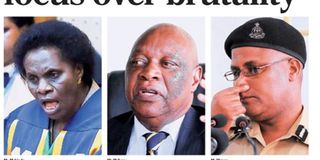Chikawe and IGP in focus over brutality

Speaker Anne Makinda called off the House business in the afternoon on the grounds that they had not reached a consensus on the debate on the state of policing—which Mr James Mbatia (Nominated–NCCR-Mageuzi) sought.
What you need to know:
Signs that the two top state officials were in the MPs’ crosshairs became evident yesterday when the group, comprised largely of opposition legislators, accused the state of sponsoring terror targeting their leaders and supporters.
Dodoma. The minister for Home Affairs, Mr Mathias Chikawe, and Inspector General of Police Earnest Mangu are likely to come under fire in Parliament today as MPs push for debate on what they see as growing police brutality targeting members of Opposition.
Signs that the two top state officials were in the MPs’ crosshairs became evident yesterday when the group, comprised largely of opposition legislators, accused the state of sponsoring terror targeting their leaders and supporters.
Trouble reared its head immediately after the question-and-answer session in the morning, with the MPs staging a protest. They paralysed the day’s business over Tuesday’s arrest of the national chairman of the CUF, Prof Ibrahim Lipumba, and numerous Opposition supporters.
The MPs were pressing for adjournment of other business to give the House an opportunity to debate the assault and arrest of the opposition leader. They disrupted the morning session and also succeeded in scuttling the afternoon session, declaring they would not transact any business until the matter was debated.
Speaker Anne Makinda called off the House business in the afternoon on the grounds that they had not reached a consensus on the debate on the state of policing—which Mr James Mbatia (Nominated–NCCR-Mageuzi) sought.
Mr Mbatia presented the motion to shelve other activities and debate the dramatic arrest of Prof Lipumba in Dar es Salaam on Tuesday but the Speaker would not hear of it.
She directed the government to prepare a statement to be tabled today—and only then would she allow the House to debate the matter. Opposition MPs were not amused by her ruling and promptly demanded that police assaults on the opposition politicians and ordinary citizen be debated there and then.
Believing that the opposition MPs were planning to storm out of the chamber, Ms Makinda asked them to leave quickly so Parliament could continue with its business.
But they started shouting instead, clearly with no intention of walking out. Her attempts to convince them to continue with the session with a pledge that the issue would be discussed the next day (today) did not soften the hearts of the opposition lawmakers, though.
“Perhaps you are not aware how serious and sensitive this issue is,” Ms Makinda said even as the agitated MPs did their best to cut short her remarks. “That is why I have decided that we debate this tomorrow after we have heard from the government.”
Mr Rajab Mbarouk Mohamed (Ole-CUF) retorted: “We know how serious this issue is...It is the seriousness and sensitivity of the matter which forces us to demand that we debate this issue immediately.”
Another CUF lawmaker was heard shouting that they would not sit until the brutal handling of their national chairman was debated and resolved. “This is not fair...the CCM secretary general is touring the country holding rallies and the police guard him,” he claimed, “but when Prof Lipumba wants the same, he is blocked.”
At one point, the newly-appointed government Chief Whip, Ms Jenista Mhagama, consulted Prime Minister Mizengo Pinda—apparently over the deteriorating situation in the House--and they seemingly agreed to ask the Speaker to adjourn the morning session prematurely.
Mr Mbatia told The Citizen later that the leaders of the government and Parliament should take responsibility for what happened.
He added: “After I saw what happened to Prof Lipumba, I phoned the Home Affairs minister. This morning, I went to the Speaker and we discussed this issue. It is amazing that they are now refusing to discuss it.”
Speaking in Parliament earlier, Mr Mbatia—who doubles as NCCR-Mageuzi national chairman—said what the police did to Prof Lipumba was contrary to an agreement reached by the political parties under Tanzania Centre for Democracy (TCD). President Jakaya Kikwete reportedly endorsed the pact.
Mr Mbatia added: “We should remember that we are talking about the national chairman of a political party which has more than 35 members in this august House.
“We are talking about the national chairman of a party which is part of the Government of National Unity in Zanzibar. If the police can do this to such a person, what can we expect to befall ordinary people out there?”
According to Mr Mbatia, what the police did on Tuesday to Prof Lipumba, CUF members, journalists and even children put in jeopardy the efforts of various stakeholders to build a peaceful nation.
Police stand accused of roughing up Prof Lipumba even though he reportedly complied with all their orders to cancel the demonstrations and a rally—and this despite the fact that the order which was issued at the eleventh hour.
The alleged police manhandling of CUF supremo is also being seen in opposition circles as evidence that the stakeholder agreements reached earlier no longer hold.
Mr Mbatia wanted to know who, at the top level, gave the order to beat up and arrest Prof Lipumba, why it was given order and in whose interests.
“If we do not plug the crack now, there is danger that we might be forced to build a new wall in the near future,” he said and added:
“We should debate this issue now so we can come up with answers to this deteriorating situation.”




